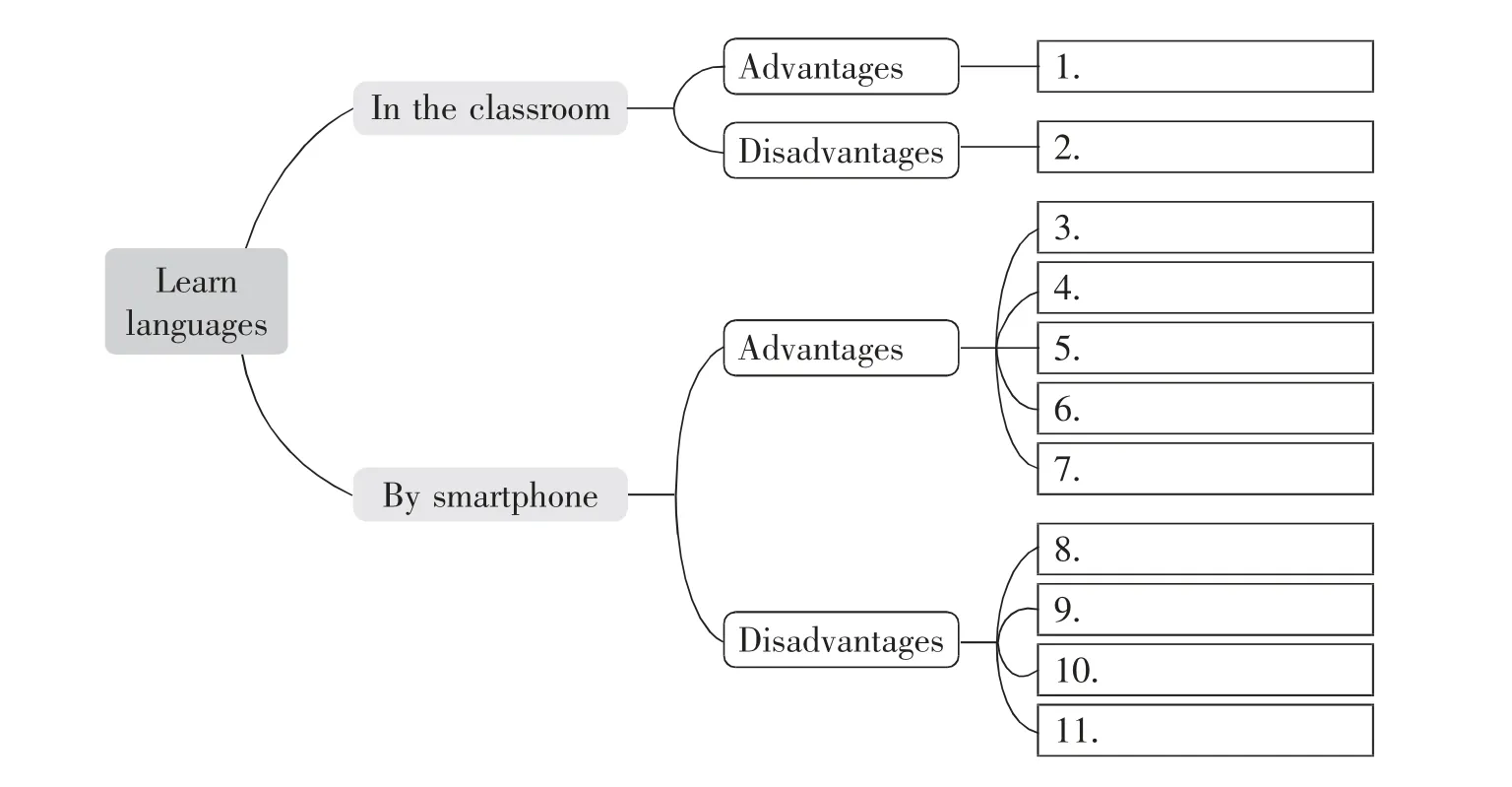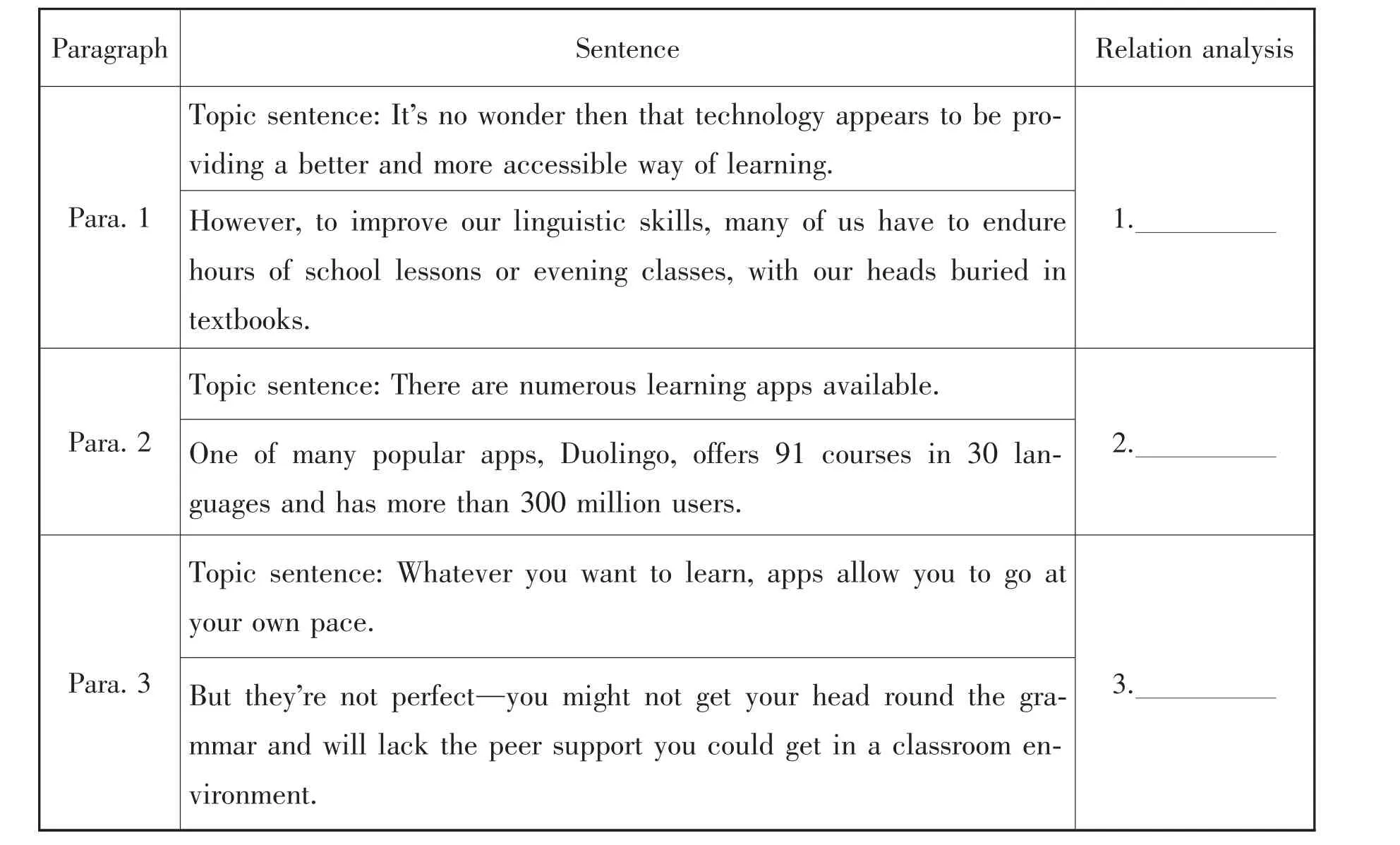智能手机vs 传统课堂
2021-11-02钟婧
As we all know, it's beneficial to learn another foreign language. It opens doors, makes you more employable and helps you make new friends. And it's fun, too. However, to improve our linguistic skills, many of us have to endure(忍耐) hours of school lessons or evening classes, with our heads buried in textbooks. It's no wonder then that technology appears to be providing a better and more accessible way of learning.
There is certainly a huge demand for language learning, and having a smartphone means you can have a virtual teacher with you wherever you go. Many app developers are keen to cash in on the demand, and there are numerous learning apps available—including the free BBC Learning English app! One of many popular apps, Duolingo, offers 91 courses in 30 languages and has more than 300 million users.
Some educational apps offer languages not popular enough to be taught at evening classes,or at most universities. And others offer “invented” language courses in Esperanto, Elvish and Star Trek's Klingon—lessons you might not find in a traditional classroom. Whatever you want to learn, apps allow you to go at your own pace.But they're not perfect—you might not get your head round the grammar and will lack the peer support you could get in a classroom environment.
So, does technology spell the end of traditional classrooms and teachers? Guy Baron, head of modern languages at Aberystwyth University,thinks not. He told the BBC that apps should be used alongside classroom methods, not to exclude(排斥) traditional teaching. And he added, “The apps are very conversational (非正式的)...They're not designed for degrees, but they could be additional resources.”
Certainly, technology is going to help in and outside the classroom. But attending a real lesson and facing a real teacher, probably force you to be more committed.
Motivation can be a problem when you are using an app. But if you have a genuine and practical reason to learn another language, you will no doubt stick with it.
Activity A Reading for understanding
Ⅰ. Text-centered chunks
open doors 打开(各种机会的)大门
cash in 从……中捞到钱财
get one's head round (sth) 理解/弄懂(复杂的事情)
peer support 同学之间的互相支持
spell the end of sth 预示某事结束
stick with 坚持下去
Ⅱ. Text-centered sentences
一、with的用法
1. However, to improve our linguistic skills,many of us have to endure hours of school lessons or evening classes, with our heads buried in textbooks. 然而,为了提高我们的语言技能,我们中的许多人不得不忍受数小时的学校或夜校课程,埋头于课本。
【点石成金】with our heads buried in textbooks意思是“埋头于课本”,是“with+宾语+宾语补足语”结构,在句中作状语,表示伴随、原因、时间、条件、方式等;其中的宾语补足语可以是名词、形容词、副词、现在分词、过去分词、不定式、介词短语等。
【运用迁移】他闭着眼睛坐在那儿。
___________________________________________
___________________________________________
2. There is certainly a huge demand for language learning, and having a smartphone means you can have a virtual teacher with you wherever you go. 语言学习的需求无疑是巨大的,有一部智能手机意味着,无论你去哪里,你身边都可以有一位虚拟老师。
【点石成金】with you意思是“和你在一起”,是“with sb”结构,意为“和某人在一起”,表示伴随。
【运用迁移】你能和我一起去图书馆吗?
___________________________________________
___________________________________________
二、主语从句
It's no wonder then that technology appears to be providing a better and more accessible way of learning. 科技似乎提供了一种更好、更容易获得的学习方式,这并不奇怪。
【点石成金】“It is/was no wonder that...”是主语从句,It作形式主语,真正的主语是后面的that从句。 另外从句中的appears to be作主语从句的谓语,意为“好像是;仿佛”。
【运用迁移】她如此心烦意乱,这并不奇怪。
___________________________________________
___________________________________________
Activity B Reading for writing
假定你是李华,你的英国朋友Edward正在学习汉语,希望你推荐一款适合他学习汉语的手机应用程序(app),并给他一些学习建议。 请你根据以下内容,给他写一封电子邮件。 内容包括:
1. 推荐app;
2. 利用app有效学习的建议。
注意:
1. 词数为80左右;
2. 可以适当增加细节,以使行文连贯;
3. 至少使用一个含with的短语或强调句;
4. 注意段落内的逻辑关系。
Dear Edward,


Best wishes!
Yours,Li Hua
写作导引
本次写作任务是建议信写作,要求学生向Edward推荐一款学习汉语的手机应用程序(app),并就他如何有效利用这款app学习汉语提出建议。同时,要求学生至少使用一个含with的短语或强调句。这些写作要求和所给语篇的主题语境是紧密相关的。我们可以通过整合同主题阅读材料的内容和语言,梳理写作思路和积累素材。
一、语篇解码
(一)内容分析
What is the text mainly about?
___________________________________________
___________________________________________
(二)宏观结构
Fill in the blanks according to the text.

(三)段内关系
Choose the best answers according to the relation in Para. 1, Para. 2 and Para. 3.
A. Deductive(演绎的).
B. Inductive(归纳的).
C. Progressive(递进的).
D. Contrastive(对比的).

Paragraph Sentence Relation analysis Topic sentence: It's no wonder then that technology appears to be providing a better and more accessible way of learning.Para. 1 However, to improve our linguistic skills, many of us have to endure hours of school lessons or evening classes, with our heads buried in textbooks.1.Topic sentence: There are numerous learning apps available.Para. 2 One of many popular apps, Duolingo, offers 91 courses in 30 languages and has more than 300 million users.2.Topic sentence: Whatever you want to learn, apps allow you to go at your own pace.Para. 3 But they're not perfect—you might not get your head round the grammar and will lack the peer support you could get in a classroom environment.3.
二、素材积累
本次写作任务是基于同一主题的文章阅读下的写作,我们通过模仿并运用阅读中的语言表达,如词块和句型,积累写作的语言素材。
(一)语言学习活动的核心表达
1. refer to a dictionary 查字典
2. translate... into 把……翻译成
3. have a good command of 精通;通晓
4. enlarge vocabulary 扩大词汇量
5. express... in Chinese fluently 用中文流利地表达……
6. improve writing skills 提高写作能力
(二)语言学习意义的核心表达
1. broaden our horizons 开阔我们的视野
2. enrich our knowledge in various fields丰富我们在各领域的知识
3. get the hang of Chinese culture and customs 了解中国文化和风俗习惯
(三)建议信的核心表达
1. How is everything going? I am very happy to hear from you. You have asked me for my advice with regard to...and I will try to make some conducive suggestions. 最近好吗? 很高兴收到你的来信。 你问了我关于……的建议,我会尽力给你一些有帮助的建议。
2. You have asked me for advice with regard to/concerning..., and I'll put forward some suggestions. 你问了我关于……的建议,我将会给你提出一些建议。
3. I'm writing to share my views on this problem, which I think may be helpful to you.我写信分享一下我对这个问题的看法,希望对你有帮助。
4. From where I stand, to cope with this problem, there are at least three things you can do. First of all, what I strongly suggest is that...What's more, it would be beneficial if you can...In addition, another way contributing to the success of solving the problem is that... 在我看来,为了解决这个问题,你至少可以做三件事情。首先,我强烈建议的是……其次,如果你能够……的话,这将会非常有益。另外,另一个有助于解决这个问题的方法是……
5. I sincerely hope that you'll find my suggestions beneficial. 我真的希望你觉得我的建议有帮助。
6. These are my suggestions and I hope they could be of some help to you. 这就是我的建议,并且我希望我的建议能帮到你。
三、写作支架
本次写作任务是一篇推荐+建议的文章,根据任务中的要求,语篇结构可定为“引出话题+提出建议+表达心愿”。 文章的框架如下:Dear ________,
You asked me for advice about________________.Here I'd like to recommend______________to you and try to give you some suggestions about ____________.
Thanks to ____________, I suggest that there are at least three functions that can be fully used. Firstly, _____________. Secondly,____________. Thirdly, ____________.
These are my suggestions and I hope they could be useful to you.
Best wishes!
Yours,
Li Hua
四、语篇过手
根据以上提供的主题、主题表达和语篇结构,学生可以写出书信的三段话。第一段,推荐学习app并点明写作目的;第二段,提出具体建议;第三段,表达心愿,给予鼓励。 总词数控制在80左右。
同时,学习运用前文阅读中出现的with短语或者强调句等。尤其要注意表达的内在逻辑关系,段落内部是演绎关系、对比关系还是递进关系,需要注意使用恰当的连词。
